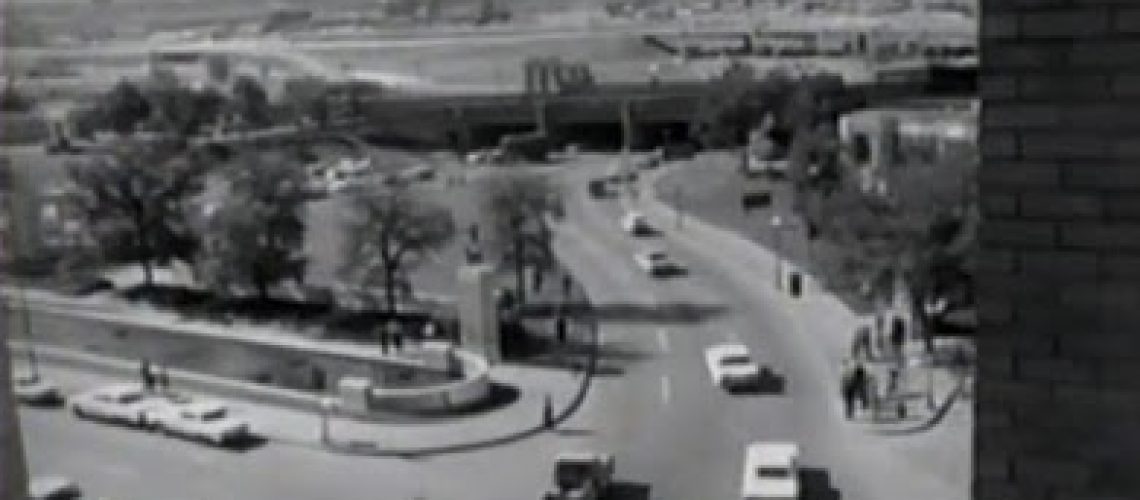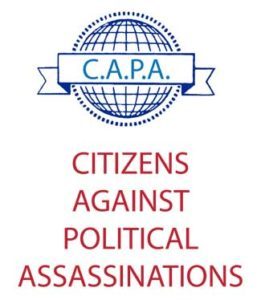The National Archives announced on Dec. 15 the release of 3,539 additional documents subject to the President John F. Kennedy Assassination Records Collection Act of 1992 (JFK Act).
As an overview by CAPA (Citizens Against Political Assassination) of this JFK document release process:
Officials said the release, made near the close of business in the late afternoon, would likely be the last of the year, with any additional releases subject to a review process that President Trump has predicted would be complete in the spring of 2018. The JFK Act and subsequent regulatory processes under the law’s Assassination Records Review Board (ARRB) required full disclosure by Oct. 26 of this year.
CAPA, among others, has advocated full and timely disclosure under the law.
Our archive of news commentaries on the topic, particularly the current sections of commentaries this fall, collects a rare if not unique section of key news reports and commentaries on the topic.
The most relevant of our News and Views archive is material covering the October through December portion of 2017, available here. A previous section that covers the period July through September, including the first JFK document release by the Archives this year in July, is available here.
The commentaries include such official administration reports as that provided by the National Archives on Dec. 15 such as its announcement: New Group of JFK Assassination Documents Available to the Public, supplemented by a link for download of the released documents. We cite also a related Archives site showing previously released documents this year: JFK Assassination Records: 2017 Additional Documents Release.
CAPA’s site for news excerpts includes also relevant commentaries on assassination-related news, such as this Dec. 15 news report from the Dallas Morning News about Friday’s newly released documents: New JFK files show FBI misplaced Oswald’s fingerprints, and CIA opened his mail — and John Steinbeck’s.
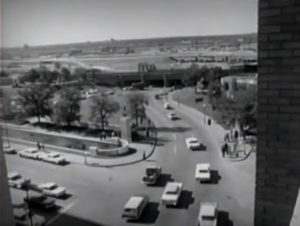 The report by Todd J. Gillman and Charles Scudder began: “The 3,539 records include FBI and CIA reports on Soviet spies, the assassination of the Rev. Martin Luther King Jr., and Lee Harvey Oswald’s trip to Mexico City a few weeks before he murdered President John F. Kennedy in Dallas on Nov. 22, 1963.” The shooting scene on Elm Street is shown in a photo from that era at right.
The report by Todd J. Gillman and Charles Scudder began: “The 3,539 records include FBI and CIA reports on Soviet spies, the assassination of the Rev. Martin Luther King Jr., and Lee Harvey Oswald’s trip to Mexico City a few weeks before he murdered President John F. Kennedy in Dallas on Nov. 22, 1963.” The shooting scene on Elm Street is shown in a photo from that era at right.
The Dallas Morning News, like nearly all mainstream newspapers and major broadcast outlets, has long supported in its news and editorial comment the 1964 Warren Commission report that ascribed Kennedy’s assassination solely to Oswald. The seven-member commission asserted Oswald acted alone in firing three shots, including the fatal bullet, from behind Kennedy during the latter’s motorcade through Dallas on Nov. 22, 1963. With rare exceptions, outlets and reporters since then have supported the findings either explicitly or by my subtle means, such as ignoring or trivializing contrary evidence.
Indeed, famed actor Alec Baldwin told an audience at a CAPA-organized banquet in Houston on Nov. 16 that MSNBC executives rejected his plan in the fall 2013 when he worked for the network on a once-a-week talk show to reexamine the assassination on the occasion of the death’s 50th anniversary.
The reason? The official position of NBC, a parent company of MSNBC, was to support the Warren Report, Baldwin confided to the CAPA audience during a dialog with CAPA board member Lawrence Schnapf, who is portrayed at left in the adjoining photo . Baldwin has said that MSNBC fired him soon afterward on what he has called a trumped-up phony scandal in which someone claimed falsely that he had made anti-gay insults.
. Baldwin has said that MSNBC fired him soon afterward on what he has called a trumped-up phony scandal in which someone claimed falsely that he had made anti-gay insults.
The banquet was co-located with a mock trial of Oswald organized by CAPA and the South Texas College of Law, Houston (STCL). The events featured also book signings for Baldwin’s new humor book You Can’t Spell America Without Me: The Really Tremendous Inside Story of My Fantastic First Year as President Donald J. Trump (A So-Called Parody) , co-authored with Kurt Andersen, and Baldwin’s memoir Nevertheless (published in the spring),
At the end of the mock trial, Judge Jay T Karahan, presiding judge of Harris County Criminal Court at Law, No. 8 and a STCL Houston alumnus, declared a “hung jury.” The panel was reported as divided 6-5 in favor of conviction following presentation of evidence emphasizing scientific findings by experts.
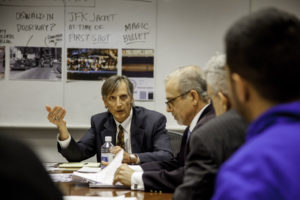 Mock trial Oswald prosecutor Gus Pappas (at left with his hand in the air), the judge (at center) and Schnapf (next to the judge) are shown in a photo by the law school’s John Everett planning the trial in advance.
Mock trial Oswald prosecutor Gus Pappas (at left with his hand in the air), the judge (at center) and Schnapf (next to the judge) are shown in a photo by the law school’s John Everett planning the trial in advance.
Relatively little news coverage occurred regarding the mock trial aside from extensive previews and live coverage by Black OP Radio, hosted by CAPA member Len Osanic with frequent guest James DiEugenio, an author and the editor of the Kennedys and King website.
 Regarding the Archives’ document release process and news coverage of that process collected by CAPA, our website archive includes excerpts and hot links from many experts who criticize in blunt terms the Warren Report, mainstream media, the CIA and other investigative agencies, and the Trump administration’s JFK records release process.
Regarding the Archives’ document release process and news coverage of that process collected by CAPA, our website archive includes excerpts and hot links from many experts who criticize in blunt terms the Warren Report, mainstream media, the CIA and other investigative agencies, and the Trump administration’s JFK records release process.
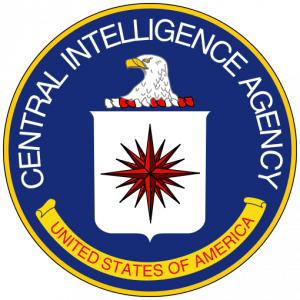 Among those experts are Future of Freedom Foundation President Jacob Hornberger, a book publisher and attorney who predicted in a column that Trump would make the document release process a self-serving charade to increase his personal leverage over investigative agencies, primarily the CIA and FBI.
Among those experts are Future of Freedom Foundation President Jacob Hornberger, a book publisher and attorney who predicted in a column that Trump would make the document release process a self-serving charade to increase his personal leverage over investigative agencies, primarily the CIA and FBI.
Quoted also in our archive are such authorities as former House Select Committee on Assassinations (HSCA) staff Dan Hardway and Mary Farrell Foundation President Rex Bradford, who called this fall’s document releases a “fiasco” and a “travesty,” respectively. Here are their most relevant columns, which we excerpted extensively:
- Assassination Archives and Research Center (AARC), The intelligence community flips off America, Dan Hardway, Nov. 4, 2017.
- Mary Ferrell Foundation, Featured: What Happened Thursday with the JFK Records? Rex Bradford, Oct. 28, 2017.
As additional perspective, this editor (CAPA board member Andrew Kreig) participated on the official, invitation-only White House conference call for news reporters on the evening of Oct. 26. This was for the White House communications office to explain to the most relevant reporters the administration’s actions and to entertain our questions.
I was thus in a position to cover the chaotic process and the ill-informed questions by several of those in the mainstream media both that night and in curating this news archive. I received additional perspective from being interviewed during the summer and fall by a number of U.S. and international news organizations about the JFK documents and their current implications.
 My lectures at two Dallas JFK conferences in November (“November In Dallas,” shown at left, and “The JFK Assassination Conference”) focused also on the document release process, news media coverage and other current implications.
My lectures at two Dallas JFK conferences in November (“November In Dallas,” shown at left, and “The JFK Assassination Conference”) focused also on the document release process, news media coverage and other current implications.
The conferences were organized by JFK Lancer Events and Productions, led by Debra Conway, and JFK Conferences, led by Judyth Vary Baker, both of them CAPA members.
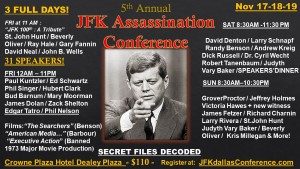 CAPA President Cyril Wecht, Schnapf and other CAPA leaders spoke, learned and networked at the Texas events to advance understanding of current research.
CAPA President Cyril Wecht, Schnapf and other CAPA leaders spoke, learned and networked at the Texas events to advance understanding of current research.
Looking ahead to 2018, the Trump administration’s self-described timetable for future disclosures is:
• March 12: FBI, CIA and other agencies must report to the archives any material they want withheld
• March 26: National Archives makes its recommendations to the president on what material warrants further withholding
• April 26: The president’s deadline for release of all remaining records.
In sum, the JFK document release process reached another milestone on Dec. 15 that requires ongoing scrutiny by an informed, independent grassroots research community, as we seek to foster with this latest report.
Shown below are excerpts from the reports cited above from the National Archives and from the Dallas Morning News, one of the first news reports about the release coming to our attention.
Appendix
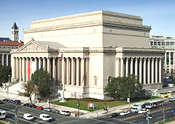 National Archives, New Group of JFK Assassination Documents Available to the Public, Staff report, Nov. 15, 2017. The versions released today were processed by agencies and, in accordance with the President’s guidance, are being posted expeditiously in order to make the documents available to the public, even before the 2018 deadline established by the President on October 26, 2017. This is the last release planned by the National Archives for this year.
National Archives, New Group of JFK Assassination Documents Available to the Public, Staff report, Nov. 15, 2017. The versions released today were processed by agencies and, in accordance with the President’s guidance, are being posted expeditiously in order to make the documents available to the public, even before the 2018 deadline established by the President on October 26, 2017. This is the last release planned by the National Archives for this year.
At this point, with the exception of 86 record identification numbers where additional research is required by the National Archives and the other agencies, all documents subject to section 5 of the JFK Act have been released either in full or in part. Any information subject to section 5 of the Act, which has been redacted from documents in any of the six public releases this year, remains subject to further review by the agencies and the National Archives, in accordance with the President’s direction.
The National Archives will release additional documents in 2018 based on the outcome of the reviews conducted pursuant to the President’s direction.
The National Archives previously released 10,744 documents on Nov. 17, 13,213 documents on Nov. 9, 676 documents on Nov. 3, 2,891 documents on Oct. 26, and 3,810 documents on July 24. The National Archives established the John F. Kennedy Assassination Records Collection in November 1992, and it consists of approximately five million pages. The vast majority of the collection has been publicly available without any restrictions since the late 1990s.
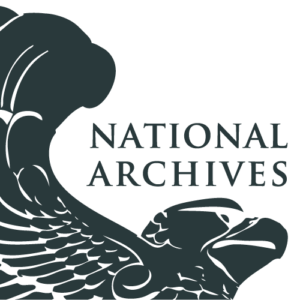 Related records site: National Archives, JFK Assassination Records: 2017 Additional Documents Release, Staff reports. The National Archives is releasing documents previously withheld in accordance with the JFK Assassination Records Collection Act. The vast majority of the Collection (88%) has been open in full and released to the public since the late 1990s. The records at issue are documents previously identified as assassination records, but withheld in full or withheld in part. These releases include FBI, CIA, and other agency documents (both formerly withheld in part and formerly withheld in full) identified by the Assassination Records Review Board as assassination records. The releases to date are as follows:
Related records site: National Archives, JFK Assassination Records: 2017 Additional Documents Release, Staff reports. The National Archives is releasing documents previously withheld in accordance with the JFK Assassination Records Collection Act. The vast majority of the Collection (88%) has been open in full and released to the public since the late 1990s. The records at issue are documents previously identified as assassination records, but withheld in full or withheld in part. These releases include FBI, CIA, and other agency documents (both formerly withheld in part and formerly withheld in full) identified by the Assassination Records Review Board as assassination records. The releases to date are as follows:
- July 24, 2017: 3,810 documents (read press release)
- October 26, 2017: 2,891 documents (read press release)
- November 3, 2017: 676 documents (read press release)
- November 9, 2017: 13,213 documents (read press release)
- November 17, 2017: 10,744 documents (read press release)
- December 15, 2017: 3,539 documents (read press release)
Dallas Morning News, New JFK files show FBI misplaced Oswald’s fingerprints, and CIA opened his mail — and John Steinbeck’s, Todd J. Gillman and Charles Scudder, Dec. 15, 2017.
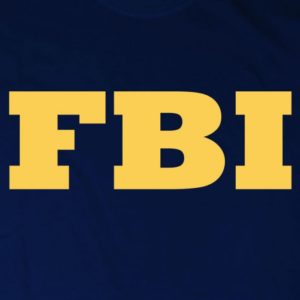 This batch likely will be the last released pending a final review of records. Many remain sealed at the request of the FBI, CIA and other agencies that pressed for more time ahead of a deadline set a quarter century earlier.
This batch likely will be the last released pending a final review of records. Many remain sealed at the request of the FBI, CIA and other agencies that pressed for more time ahead of a deadline set a quarter century earlier.
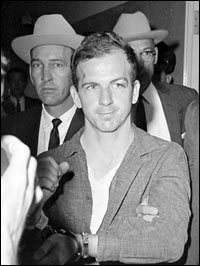 For decades, debate has raged not only over whether Oswald acted alone but whether the FBI and CIA could have stopped him. The latest documents provide fresh proof that he was in their sights: a 1975 CIA memo marked “top secret” shows that Oswald (shown under arrest in Dallas) was on a “watch list” of people whose mail would be intercepted from Nov. 9, 1959, to May 3, 1960, and again from Aug. 7, 1961, through May 28, 1962.
For decades, debate has raged not only over whether Oswald acted alone but whether the FBI and CIA could have stopped him. The latest documents provide fresh proof that he was in their sights: a 1975 CIA memo marked “top secret” shows that Oswald (shown under arrest in Dallas) was on a “watch list” of people whose mail would be intercepted from Nov. 9, 1959, to May 3, 1960, and again from Aug. 7, 1961, through May 28, 1962.
The same watch list included Francis Gary Powers, the U-2 pilot shot down on May 1, 1960. His mail was opened until two months after his release by the Soviets. CIA also opened the mail of Earl Browder, the head of the Communist Party of the United States, playwright Edward Albee, novelist John Steinbeck, and a daughter of David Rockefeller, chairman of Chase Manhattan bank.
Another revelation comes from a July 1978 memo to an attorney on the staff of the House Select Committee on Assassinations: The FBI was unable to locate the original fingerprints lifted from the rifle found at the sniper’s perch on the sixth floor of the Texas School Book Depository.
Dallas police turned those over a few days after the assassination and never got them back. Top FBI officials told House investigators that finding the prints would be a “mammoth research effort.”
The head of the bureau’s fingerprint section told House investigators that standard procedure would have required returning the original prints to Dallas police, but “this case was not routine, nor was it handled as such.”

